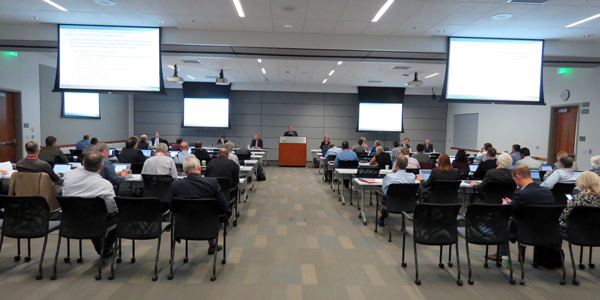By Jason Fordney
FOLSOM, Calif. — At its first public meeting with potential customers of its reliability coordinator (RC) services Thursday, CAISO divulged that most of the load in the West has signed letters of intent for the new program.
In response to a question, CAISO Regional Integration Director Phil Pettingill said he could not say publicly who has signed letters of intent and nondisclosure agreements to receive RC services.
“What I feel like I can say is, most of the load that is in the Western Interconnection has signed those agreements with us,” Pettingill said. “We are really talking to almost everybody.”
He added that the letters of intent are not binding and can be withdrawn. The notifications that have been sent to Peak Reliability from customers planning to depart its RC program are also nonbinding.
NERC’s reliability standards require balancing authorities and transmission operators to procure RC services, which include outage coordination, real-time situation awareness, and system restoration coordination and training.
CAISO on April 5 issued its initial proposal for RC services, which it hopes to have running by May 2019. The ISO and Peak are also developing competing proposals for new energy markets that could develop into a full RTO. (See Multiple Entities, Markets Now Beckon in West.)
CAISO is now developing prices for its supplemental, non-core RC services, such as hosting advanced applications and addressing certain critical infrastructure protection services, Pettingill said in a presentation.
The ISO says its RC services will be much cheaper than Peak’s, but Peak countered that the comparison is not straightforward because Peak has more RC experience and offers certain customer services such as the WECC Interchange Tool, the Enhanced Curtailment Calculator and the Peak Synchrophasor Project. (See Peak/PJM Enter Western Market ‘Commitment Phase’.)
In developing the RC services, the ISO will issue straw proposals and gather feedback to revise the initiatives. The final proposal will be subject to approval by the Board of Governors and FERC.
CAISO hopes for the commission’s approval in October.
The goal is for potential RC customers to export their network models by August and begin data integration and system verification in January 2019. RC service agreements would be executed in November with much of the integration and testing occurring next year, Pettingill said.
CAISO will use its “activity-based costing system,” which has been used for all rate design initiatives since 2011, to determine the costs of RC services.
About 6% of CAISO’s annual costs would be allocated to RC services in the revenue requirement for 2019 and 2020 rates, CAISO CFO and Treasurer Ryan Seghesio said Thursday.
“The ISO is committed to a really level, stable revenue requirement,” Seghesio said. CAISO’s revenue requirement of $190 million to $200 million has been stable for about 11 years. There is a FERC-approved $202 million cap on the revenue requirement, he said, to prevent surprises for market participants.






